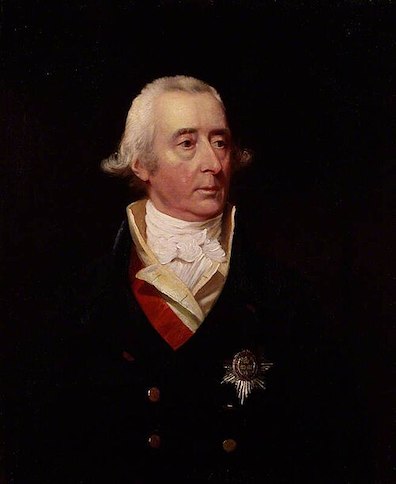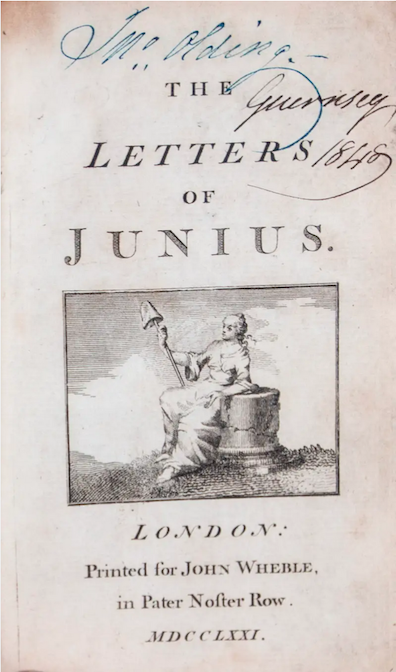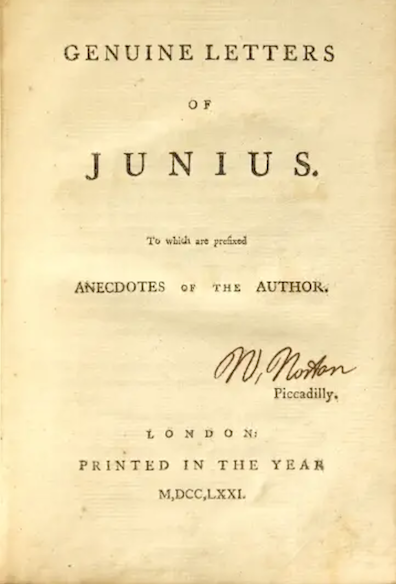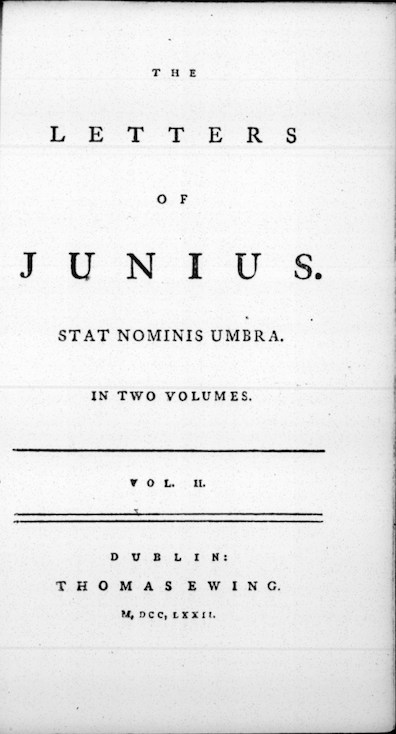The first letter by
"Junius" appeared in Henry Sampson Woodfall's
Public
Advertiser on 21 November 1768, and many more such
letters appeared in the same paper from January 1769 to January
1772. Their great popularity can be gauged by the fact that a
dozen or more pirated editions appeared during the years that
the paper was printing them, prompting the publication of an
authorized
Letters of Junius in two volumes in 1772.
The
letters articulated Whig causes like American independence and
advocated for democratic reforms like press freedom, individual
rights, and democratic elections. More importantly for Joyce's
purposes, they fiercely attacked corruption in the British
government and heaped sarcastic scorn on individual corrupt
ministers, chief among them Augustus Henry Fitzroy, the 3rd Duke
of Grafton.
The Junius-like voice in
Oxen starts by seconding the
Citizen's view that Jews are loyal only to themselves, not their
host nations. The narrator charges Bloom—"
this alien, whom
the concession of a gracious prince has admitted
to civic rites"—with ingratitude, referring to the
decision in the middle of the 17th century (first by Oliver
Cromwell and then by King Charles II) to allow Jews back into
England after their expulsion in 1290. The granting of "civic
rights" to Jews, however, was not gracious but grudging. Gifford
details the glacial progress: "in 1723, the right to give
evidence in courts of justice; in 1753, the right of
naturalization; in 1830, the right to membership in civic
corporations; in 1833, admission to the profession of advocate;
in 1845, to offices of alderman and lord mayor; and in 1858, to
Parliament." Slote, Mamigonian, and Turner observe that the 1753
naturalization bill was repealed several months later, "after
country-wide agitation." In 1783, they note, the Irish
parliament passed a bill allowing "naturalisation of all
foreigners except Jews. That bill was finally repealed in 1816,
at which time Jews were finally allowed citizenship."
Junius never expressed antisemitic views, but he did indulge
Whig hatred of the
Scots, who had rapidly infiltrated
Westminster power structures after Scotland agreed to join
England in a United Kingdom in 1707. Complaining about their
influence both at court and in Parliament, Junius advised King
George III that "the Scots "have no claim to your favour," and
in the Preface to his
Letters he wrote, "Without any
abstract reasoning upon causes and effects, we shall soon be
convinced by experience, that
the Scots, transplanted from
their own country, are always a distinct and separate body
from the people who receive them. In other settlements,
they only love themselves; in England, they cordially love
themselves, and as cordially hate their neighbours" (xxx). This
sentiment perfectly dovetails with the canard about disloyal
Jews worming their way into other countries, so it made artistic
sense for Joyce to associate the antisemitic trope with the Whig
politician's voice. In the final sentence of the paragraph he
cunningly acknowledges what he has done by applying Junius's
metaphor for Scots to a Jew: Bloom is "at his best an exotic
tree which, when rooted in its native orient, throve and
flourished and was
abundant in balm but,
transplanted
to a clime more temperate, its roots have lost their
quondam vigour."
Between these bookending expressions of antisemitism, the
narrator attacks Bloom for feeling superior to the libidinous
young men whose raucous conversation is adding to the trials of
Mrs. Purefoy. How dare he style himself a defender of women, the
prose asks, when "he is, if report belie him not, his own and
his only enjoyer"? By the logic of
Oxen, the purpose of
marriage is to produce children, and this criticizer of the
young men's disrespect for women has disrespected his own wife
for more than ten years. "Has he not nearer home a seedfield
that lies fallow for the want of a ploughshare? A habit
reprehensible at puberty is second nature and an opprobrium in
middle life." That habit, of course, is masturbation.
Joyce's ad hominem attack on his protagonist bears no small
resemblance to some of the personal attacks in the
Letters.
In his study of the sources of
Oxen Robert Janusko
quotes from a 24 April 1769 letter addressed to the Duke of
Grafton, observing that in both the letter and the parody "there
is an emphatic attack by the speaker on the unwillingness of his
victim to act in accordance with his role, Grafton to maintain
order and Bloom to perform and protect his marital duties.
Instead, the accuser states, they have gone to the opposite
extreme; Grafton supports the unconstitutional efforts of
Parliament to prevent a duly elected member from taking his seat
and Bloom is guilty of attempted adultery, masturbation, and
allowing Boylan to 'debauch' his wife. Both Grafton and Bloom
are reminded that they hold their positions only by chance; the
one has become acting premier by the illness of Lord Chatham,
the other holds his civil rights by 'the concession of a
gracious prince'. Finally, of course, neither Junius nor Bloom's
adversary are above making use of embarrassing information from
private life to expose their targets to the full view and wrath
of their readers" (72).
The number of Junius's words and phrases that found their way
into
Oxen is staggering. At the risk of becoming
tedious, this note will conclude with a partial accounting of
such borrowings that can be discerned in this one parodic
paragraph, quoting first from Joyce's prose and then from the
1772 edition of the
Letters. Readers given to checking
citations will notice that nearly all quotations come from the
first volume, suggesting that Joyce may have spent time only
with this one.
Many of the borrowings come from politics, or from legal and
societal issues related to the exercise of political power.
Joyce's mention of "
civic rights" in the first sentence
reflects the letter-writer's enduring and principled
preoccupation with the individual human "rights" of a people,
including "civil rights," "political rights," and "religious
rights." The mention of Bloom's political "
patron" and a
"
prince" recalls the frequent use of these terms in the
Letters,
and the phrase "
gracious prince" appears to have been
prompted by a particular sentence: "Let us suppose a gracious,
well-intentioned prince, made sensible at last of the great duty
he owes to his people" (1.217-18). Similarly, styling Bloom "
the
lord paramount of our internal polity" alludes to
one particular sentence in the letters: "The extraordinary step
you took to make Sir James Lowther Lord Paramount of Cumberland,
has ruined his interest in that country forever" (1.55).
The legal-sounding phrase "
a tenant at will" (implying
someone who derives his benefits only from the will of a lord,
not by lease) comes from another specific sentence: "Are these
glorious privileges the birthright of the people, or are we only
tenants at the will of the ministry?" (1.201). Saying that Bloom
has drawn attention to questions of sexuality "
as it was
indeed highly his interest not to have done" echoes
another particular sentence: "It is indeed highly your interest
to maintain the present house of commons" (1.210). Many other
such words connected to questions of social and political
relationship appear in the
Letters: the "
loyalty"
that Bloom might be expected to display, the "
benefits"
that he has received, his long refusal to give Molly her
"legitimate
prerogative," the "
doctrines" that
engross him, and the "
morals" that he regards as proper
for young men of a certain social stratum.
Junius's lexicon also extends to naming the moral attitudes held
by decent, rightthinking people. When the narrator protests,
"Far be it from
candour to violate the bedchamber of a
respectable
lady," he reflects both the determination of Junius to discuss
serious matters "with candour and decency" (1.2) and his
courtesy toward women: "I will not lead her into public, as you
have done, nor will I insult the memory of departed beauty. Her
sex, which alone made her amiable in your eyes, makes her
respectable in mine" (1.71). The narrator's determination not
"to cast the most distant
reflections" upon Molly's
virtue employs a now-obsolete sense of that word: "The remainder
of your reflections upon Mr. Grenville's conduct destroy
themselves" (1.114). As for Bloom, his "peevish
asperity"
to a rancher at the cattleyard (the word denotes harshness of
tone or manner) affords a counter-example to the positive
self-referential use of the word in the
Letters: "By the
asperity of Junius's style, I cannot indeed call him a
flatterer" (1.38).
Bloom's sexual irregularities draw forth a number of expressions
used by Junius. What the narrator says of his adulterous
liaisons—"The lewd suggestions of some
faded beauty may
console him for a consort neglected"—had been said already of a
British minister: "the prime minister of Great Britain, in a
rural retirement, and in the arms of faded beauty, had lost all
memory of his Sovereign, his country and himself" (1.63). The "
oppobrium"
of Bloom's masturbatory self-love, and his failure to stop
Boylan from leaving Molly "
debauched," recall other men
who have mistreated their wives: "the opprobrium of marrying a
near relation of one who had debauched his wife" (1.83). Hanging
out with "a generation of unfledged
profligates," and
presuming to impart to them the sexual wisdom of age, is not the
behavior of a virtuous man: "Though deceived perhaps in his
youth, he would not, through the course of a long life, have
invariably chosen his friends from among the most profligate of
mankind" (1.154-55). By neglecting the duties of his marriage
bed Bloom has become "
his own dupe," unlike the author of
the
Letters: "what opinion would you have conceived of
my discretion, if I had suffered myself to be the dupe of so
shallow an artifice?" (1.169).
Finally, it can be observed that Joyce's narrator mimics the
rhetorical effects of Junius's prose by adopting some of his
distinctive verbal patterns. The rhetorical question, "Has
he forgotten this as he forgets all benefits received?"
recalls a similar sentence in the Letters: "Have you
quite forgotten that this man was once your Grace's friend?"
(1.54). The charge, "let his practice consist better with
the doctrines that now engross him" imitates Junius's
marvelously balanced pronouncement: "His arguments consist
better with the title he has assumed, than with the principles
he professes" (1.84). And an apostrophe to Molly—"Unhappy
woman, she has been too long and too persistently denied her
legitimate prerogative"—echoes not just Junius's
frequent use of the word "unhappy" but his exclamatory
placement of that adjective at the head of one sentence:
"Unhappy man! what party will receive the common deserter of
all parties?" (2.5).



